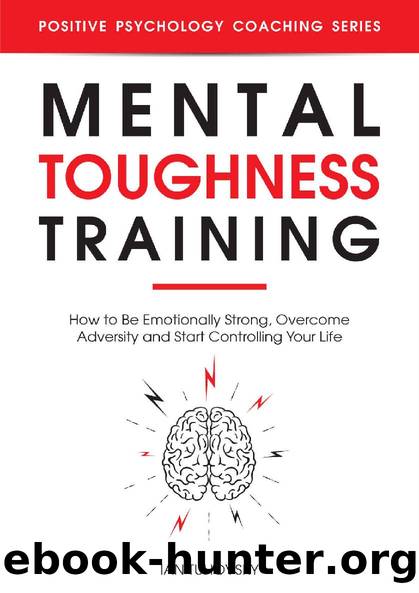Mental Toughness Training: How to be Emotionally Strong, Overcome Adversity and Start Controlling Your Life (Positive Psychology Coaching Series Book 23) by Ian Tuhovsky

Author:Ian Tuhovsky [Tuhovsky, Ian]
Language: eng
Format: epub
Published: 2020-10-15T00:00:00+00:00
Chapter Six:
Building Mental and Emotional Strength
Emotional strength is not about not reacting or withholding your emotions. Itâs about being able to accept your emotions without falling apart, and then processing those emotions in a healthy way. Most people are easily derailed by negative events even if they donât seem to outwardly react to them. The bad emotions build up over time and repressing them takes energy. This takes away from your focus, your energy, and your overall outlook on life. By processing them and becoming emotionally healthy, you give yourself the best shot at having a happy, productive life.
Iâve included mental strength here as well because there is some overlap. To be emotionally strong, there are times when you need to be mentally strong. With extreme events, your emotions are going to be very powerful. During these times it can be important to have the right reaction while also accepting your emotional state as it is.
Letâs start off by taking a look at the emotional states that are most common in your life. From there we can begin work on altering these states and creating positive, productive states as the new baseline in your life.
Emotional States
Your emotional state is like a general outlook of where you are emotionally. Imagine it as the default state you start a regular day in. Sometimes itâs hard to tell what it is because tiredness or having to wake up at an allocated time can have an impact. We are aiming for a positive state, rather than a negative or even neutral one. To figure out what your usual emotional state is, here are a couple of questions to ask yourself:
If you were to gauge your mood during a neutral time of the day, when you are doing nothing, what would it usually be?
What kind of emotions do you tend to express a lot in your day-to-day life? Remember you must be honest with yourself here, itâs okay if there are negatives.
When having alone time, such as in the shower/bath, or relaxing, are there any emotions present? Anxiety or sadness can often creep in at these times, so itâs good to be aware of them.
During social interactions, what types of words do you use? This is a tough one because you need an accurate memory, but it can reveal tendencies on how you handle things. For example, some people express negatives with very powerful words, which makes them feel like they have more impact. They may use âobeseâ instead of âoverweightâ or âI hate it/themâ instead of âI donât like it/them.â
Do you focus on the negatives of a situation more than the positives? The risks instead of the rewards?
Are there emotions that you feel a random need to express, or any kind of outburst (however small)?
If you were to look back on your life recently, which type of emotion/mood do you feel the majority of the time?
Download
This site does not store any files on its server. We only index and link to content provided by other sites. Please contact the content providers to delete copyright contents if any and email us, we'll remove relevant links or contents immediately.
We Need to Talk by Celeste Headlee(4892)
Pre-Suasion: A Revolutionary Way to Influence and Persuade by Robert Cialdini(3433)
Captivate by Vanessa Van Edwards(3312)
I Love You But I Don't Trust You by Mira Kirshenbaum(3243)
Goodbye Paradise(2989)
How to Win Friends and Influence People in the Digital Age by Dale Carnegie & Associates(2841)
How to win friends and influence people by Dale Carnegie(2837)
The Hard Questions by Susan Piver(2561)
Fluent Forever: How to Learn Any Language Fast and Never Forget It by Gabriel Wyner(2461)
The Dictionary of Body Language by Joe Navarro(2443)
Surrounded by Idiots by Thomas Erikson(2372)
The Story Factor: Inspiration, Influence, and Persuasion through the Art of Storytelling by Annette Simmons(2253)
Just Listen by Sarah Dessen(2187)
How to Be Yourself by Ellen Hendriksen(1947)
The Power of Moments by Chip Heath & Dan Heath(1897)
Behave: The Biology of Humans at Our Best and Worst by Robert M. Sapolsky(1830)
How to Make Small Talk by Melissa Wadsworth(1806)
Not Nice: Stop People Pleasing, Staying Silent, & Feeling Guilty... And Start Speaking Up, Saying No, Asking Boldly, And Unapologetically Being Yourself by Dr Aziz Gazipura PsyD(1763)
The Small BIG Small Changes that Spark Big Influence by Steve Martin & Noah Goldstein & Robert Cialdini(1548)
